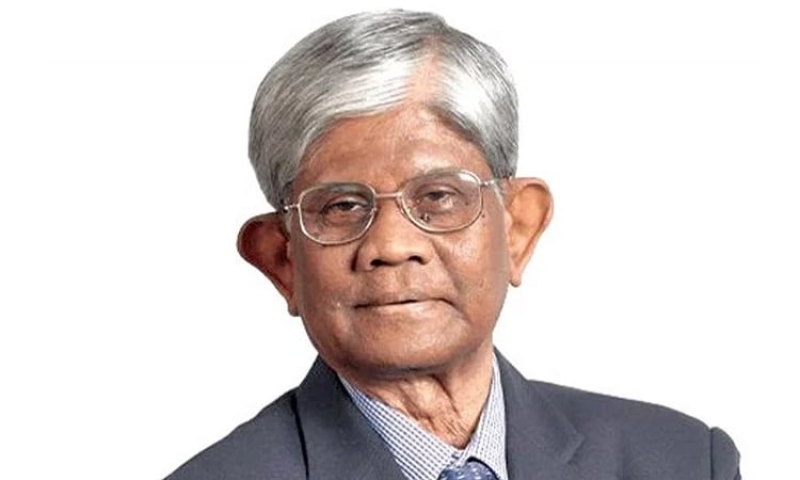- Power generation at Payra Thermal Power Plant 1st unit starts after a month |
- Irregularities, injustice will no longer be accepted in politics: Jamaat Ameer |
- 2 arrested in Jhenaidah for allegedly selling madrasa student |
- Koko’s wife campaigns for Tarique in Dhaka-17 |
- Bangladeshi Expats Cast 4.58 Lakh Postal Votes |
Macroeconomic Stability in Bangladesh: Finance Adviser

Finance Adviser Dr Salehuddin Ahmed. File Photo
Finance Adviser Dr. Salehuddin Ahmed today assured that Bangladesh's macroeconomic conditions remain strong, bolstered by a positive current account balance, a favorable financial account, and healthy inflows of remittances.
"Our macroeconomic situation is largely stable. The current account balance is positive, the financial account is in a good position, and remittance flows remain strong," Dr. Ahmed stated during a press briefing after the second day of the ongoing Deputy Commissioners (DC) Conference at the Osmani Memorial Auditorium. Key secretaries from various ministries also attended the session.
Addressing the proposals from the Deputy Commissioners, Dr. Ahmed highlighted several key recommendations aimed at improving local governance and public service delivery. These included the digital disbursement of allowances for residents transitioning between upazilas in the Chittagong Hill Tracts (CHT), a focus on mental and physical disability services, easier access to finance for small and medium-sized enterprises (SMEs), and addressing transportation challenges in remote areas.
"The DCs have also proposed expanding the tax base, as many rural businesses make substantial profits without contributing to taxes or VAT," Dr. Ahmed noted. "We’ve assured them that we’ll consider these proposals as they reflect practical challenges and offer opportunities for improvement."
The adviser emphasized the government's commitment to addressing specific challenges, suggesting that DCs channel their concerns through the Cabinet Division, which would coordinate with Divisional Commissioners for resolutions.
Another significant issue raised was the widespread use of cash transactions, particularly among doctors and other professionals. Dr. Ahmed suggested digitalizing these transactions to ensure transparency and maintain proper records. "We aim for faceless transactions, where taxpayers never have to directly interact with tax or customs officials. Our Ministry is working on this initiative, ensuring that all foreign transactions are also faceless," he added.
Responding to a question about the country's negotiations with the International Monetary Fund (IMF), Dr. Ahmed clarified that the government is not desperate for foreign loans. "We are not seeking IMF funding out of necessity but for specific projects. We’ve communicated to the IMF that we are proceeding on our terms," he said, adding that the government anticipates receiving two tranches from the IMF in June, which will aid in balance of payments support.
Regarding the expansion of the tax net, Dr. Ahmed urged the National Board of Revenue (NBR) to conduct targeted drives in collaboration with local DCs to identify high-value taxpayers, especially in industrial zones. "Expanding the tax base is essential. We are focusing on direct taxes, which will help maintain a fair and balanced system," he remarked.
Dr. Ahmed also discussed the importance of efficient government services at the field level. He pointed out that timely implementation is one of the major challenges in Bangladesh, and local officials must play an active role in ensuring quicker execution of policies and programs. "Field-level officials need to step up as true public servants to ensure that citizens receive the services they deserve," he said.
In terms of infrastructure development, Dr. Ahmed stressed the need to focus on local, need-based projects under the Annual Development Programme (ADP), especially those that generate employment and strengthen rural areas. "Rural development hinges on improved IT infrastructure and access to electricity. Without advancements in the IT sector, we cannot achieve balanced development," he explained.
Dr. Ahmed also acknowledged suggestions for enhancing the management of educational institutions, particularly in the char (riverine) areas. He emphasized the need for better teacher facilities, including hostels for school staff, and improved coordination between divisional commissioners, DCs, and other local officials to streamline services.
The DCs also proposed increased support for identifying potential taxpayers in industrial areas. "Despite having around 50 lakh industrial units, only five lakh are currently paying VAT. We need to improve tax collection by targeting these sectors more effectively," he said.
In response to concerns about revenue collection, Dr. Ahmed reiterated that the government is focused on improving direct tax collection while reducing reliance on indirect taxes. He also advised citizens to request receipts for professional fees from doctors and lawyers, underscoring the importance of keeping accurate records for tax purposes.
"Moving forward, we envision a shift in how we perceive the role of DCs. We want them to be true servants of the public, not just administrators," he concluded.
Dr. Ahmed also discussed the crucial support that international organizations such as the Food and Agriculture Organization (FAO) and International Fund for Agricultural Development (IFAD) play in Bangladesh’s agricultural sector. "I've already reached out to FAO and IFAD to seek greater assistance in advancing our agricultural initiatives," he said.

